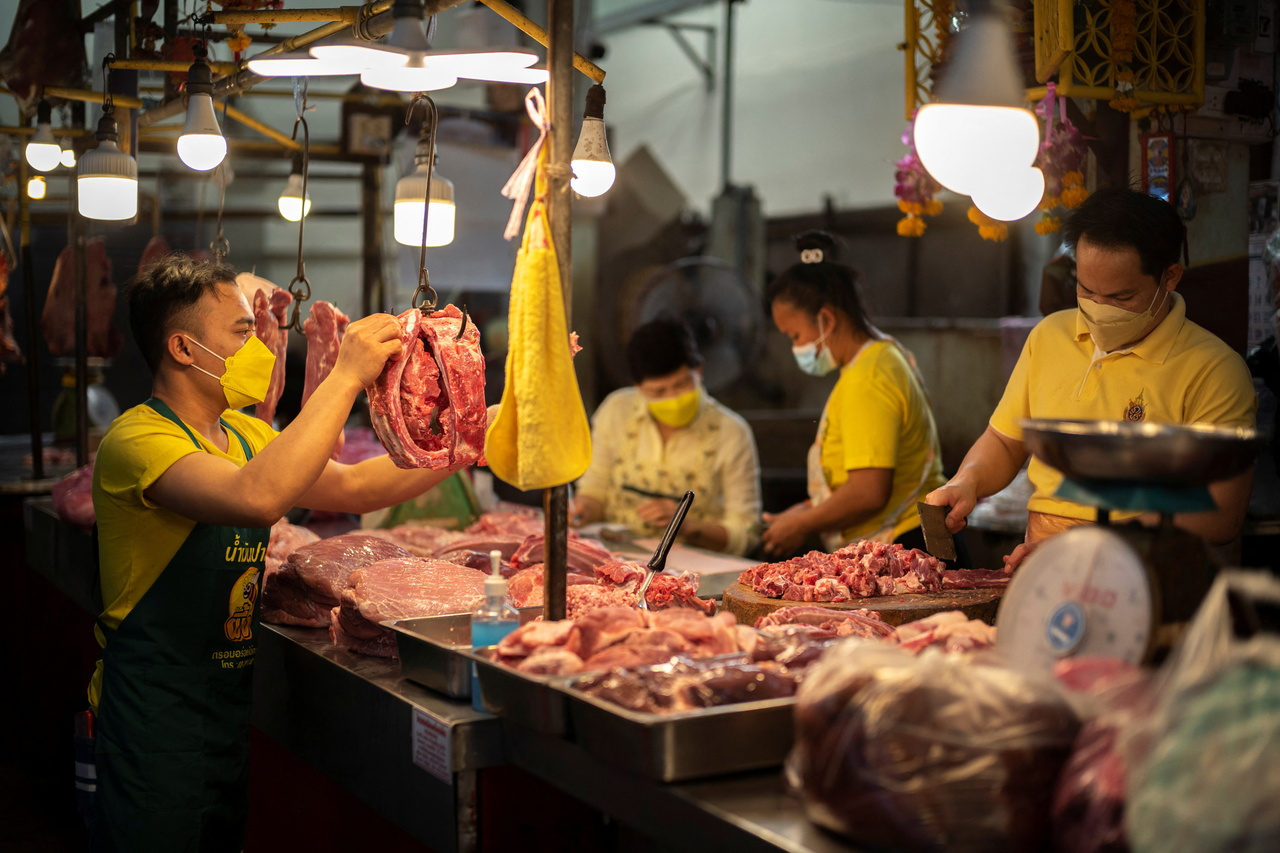High pork prices weigh down on Thai consumers as Chinese New Year nears
Sign up now: Get insights on Asia's fast-moving developments

Vendors sell pork at their stall inside a market in Bangkok, on Jan 10, 2022.
PHOTO: REUTERS
BANGKOK - Grocery shopping in Thailand these days involves more careful thinking and calculating for shoppers like insurance agent Piyanan Laohabut, who has watched the prices of pork products rise steadily in the last few months.
Driven by increasing farming costs and a dwindling supply of pigs due to swine diseases, the retail price of pork has risen at least 30 per cent in the last few weeks, from around 150 baht (S$6.07) per kg to at least 200 baht or more in some regions.
"We now try to buy less pork and replace it with chicken or local fish. Those have not increased as much (in price)," said 42-year-old Piyanan, who lives in Bangkok with her husband, son and mother-in-law.
Prices are expected to climb, and the price of pork - a common ingredient in many Thai dishes - could hit 300 baht per kg in the lead up to Chinese New Year, when the demand rises, said the Swine Raisers Association of Thailand.
"Prices will continue to rise because there is limited supply and feed costs are very high with no signs of improvement," said association president Surachai Sutthitham last week.
The Thai authorities have introduced a slew of measures, including a ban on live pig exports, caps on the prices of raw ingredients and soft loans for farmers, in a bid to ease pressure on consumers even as the country faces rising inflation and high household debt.
On Tuesday (Jan 12), the Department of Livestock Development said it detected a case of African swine fever from a slaughterhouse in the Nakhon Pathom province near Bangkok. A 5km-radius around the facility has been declared a disease outbreak zone.
This is the first official confirmation of the presence of African swine fever in the country.
It comes after growing speculation and reports from local bodies that the disease was already decimating pig herds and contributing to the soaring pork prices.
Faced with public pressure, investigators tested 309 blood and surface swab samples from 10 farms and two slaughterhouses on the weekend.
African swine fever is harmless to humans, but it is highly contagious and fatal to pigs.
There is no vaccine for the virus, and the only way to control an outbreak is to cull infected pigs and disinfect the farms.
African swine fever outbreaks have been reported in China and neighbouring countries such as Vietnam.
But the Thai authorities have repeatedly denied such an outbreak, attributing most farm pig deaths to another viral disease called porcine reproductive and respiratory syndrome.
Opposition leaders in Parliament have vowed to hold the government accountable for what they allege to be a cover-up of the outbreak.
In a bid to shore up domestic supplies, Thailand has banned the export of live pigs until April 5.
It exports about 5 per cent of its live pigs to countries such as Cambodia, Vietnam, Laos and Myanmar.
This year the country is expected to produce 13 million pigs, a sharp drop from the 19 million last year, said Commerce Minister Jurin Laksanawisit.
The number of pig farmers has also dwindled, from 200,000 to around 80,000, said the Swine Raisers Association of Thailand.
It added that rising production costs and the spread of deadly viral diseases have caused many to go bust.
To provide cheaper alternatives to pork, the authorities and poultry traders on Tuesday agreed to freeze chicken prices for six months, capping prices of chickens at farms at 33.50 baht per kg for live birds, and 60-70 baht for chicken meat.
Other raw ingredients for daily cooking - from coriander to prawns, and rice to oil - have also been hit by rising prices and tight supplies.
Ms Piyanan, who visits the wet market and wholesale store once a week, said her family's grocery budget has increased by 20 per cent in recent months.
"To cut costs, we are thinking of buying more frozen meat," she added.
Restaurants which have already been badly affected by Covid-19 curbs and closures are also feeling the pinch.
One hotpot chain, Suki Teenoi, announced last month that it was raising its buffet prices from 199 baht to 219 baht per head, due to increases in the cost of ingredients and operating expenses.
However, Mr Gavin Koh, Singaporean owner of Eats Payao, which serves Thai and South-east Asian dishes, has decided to absorb the higher cost of ingredients.
"There is no point in increasing menu prices, you might lose the customer base. Earning less is all right, as long as we are still able to earn," said Mr Koh, 39, who runs the restaurant with his Thai wife.


